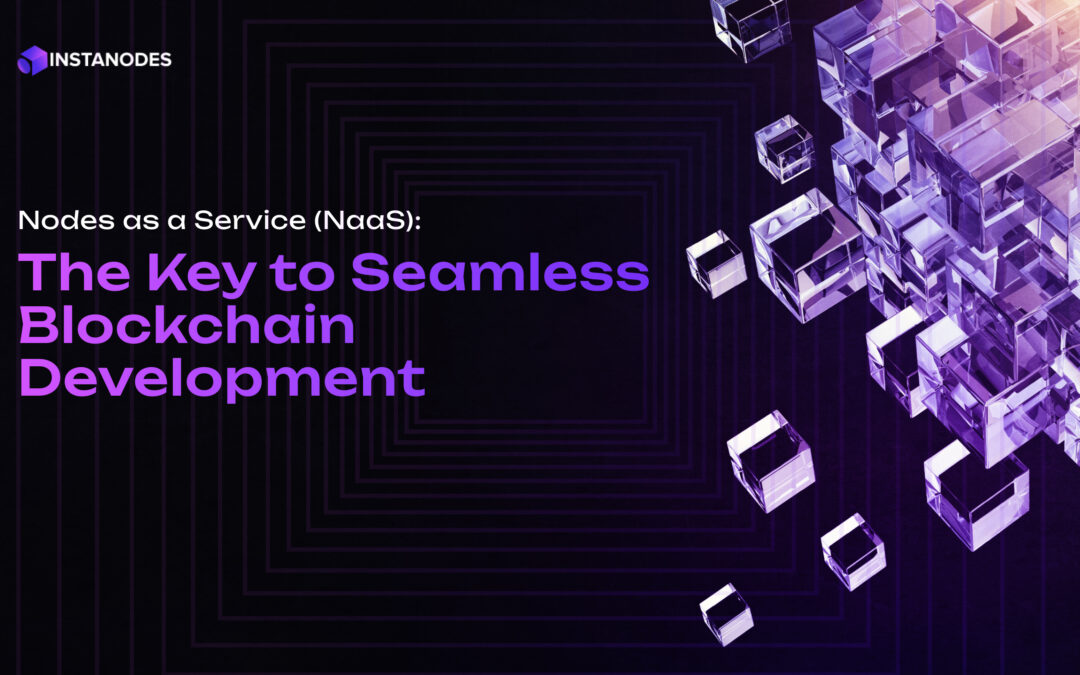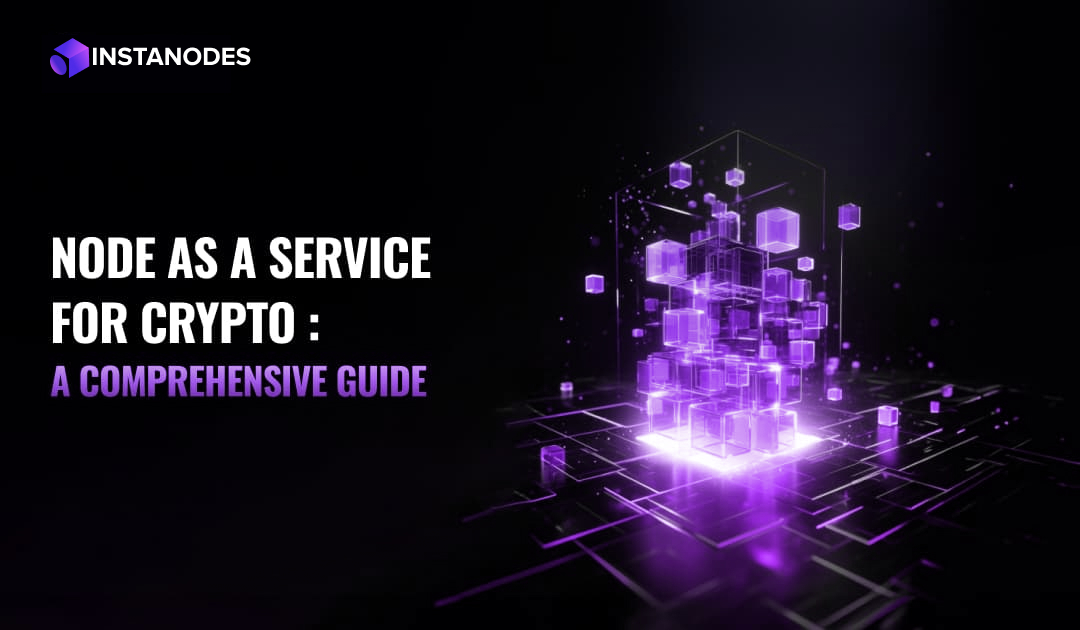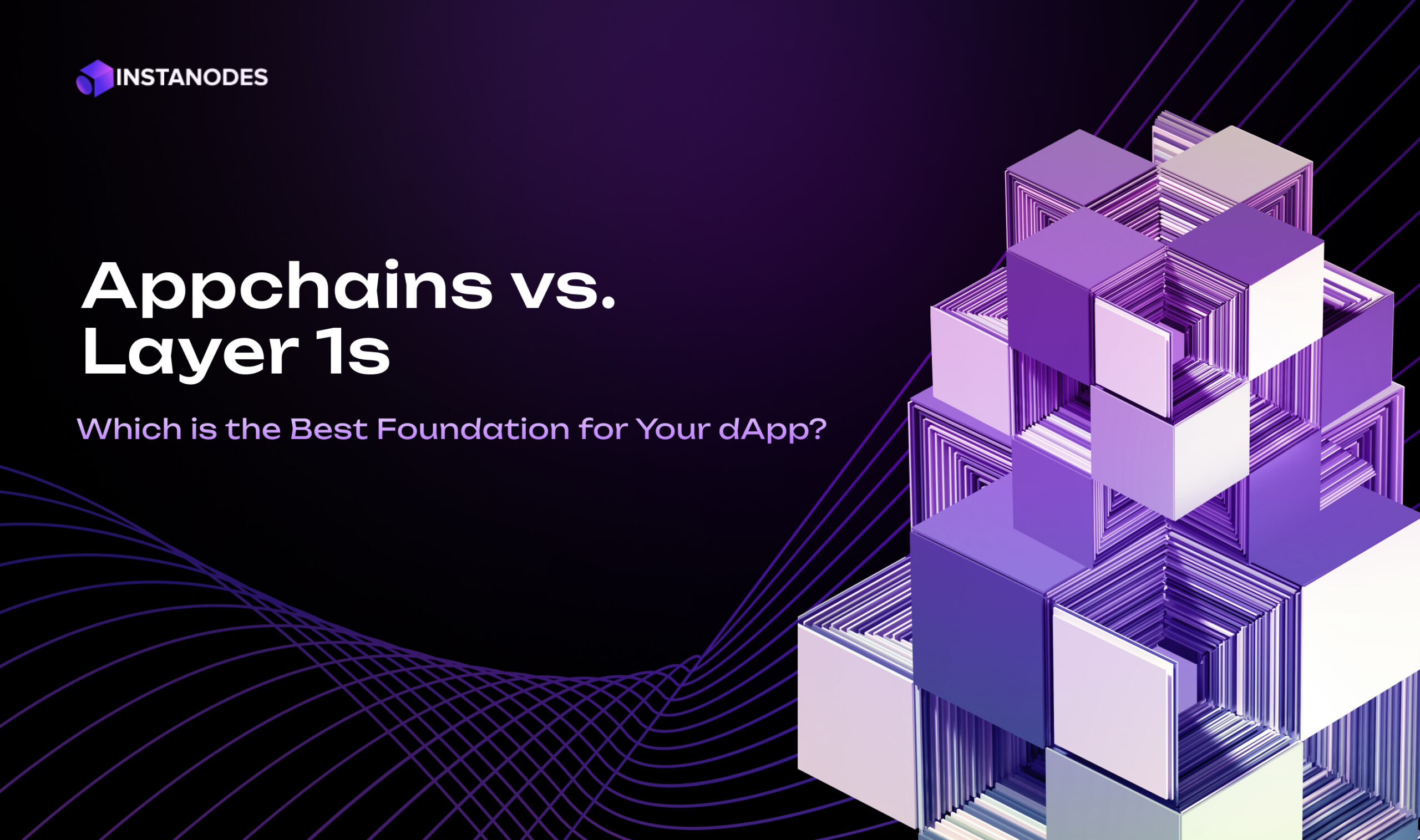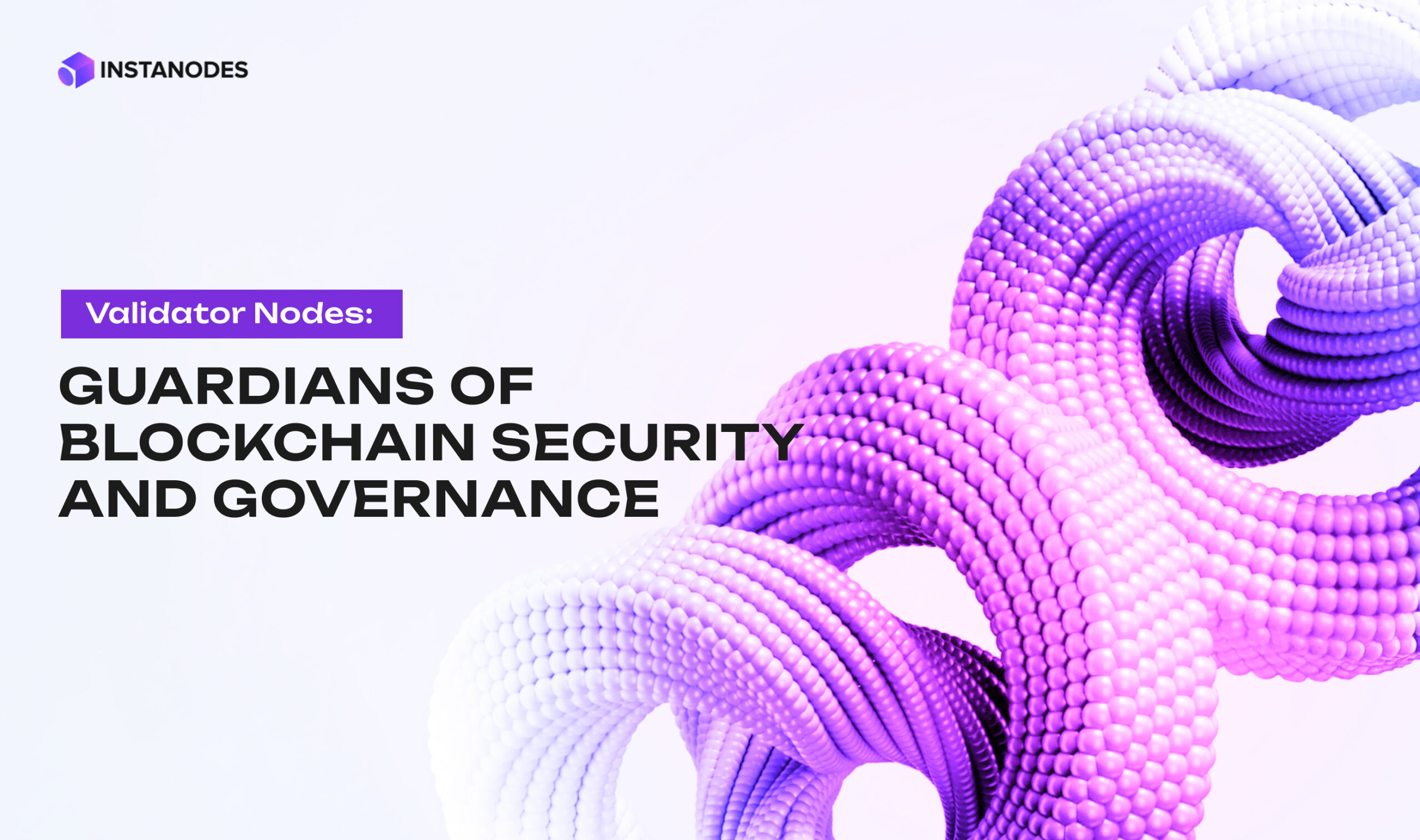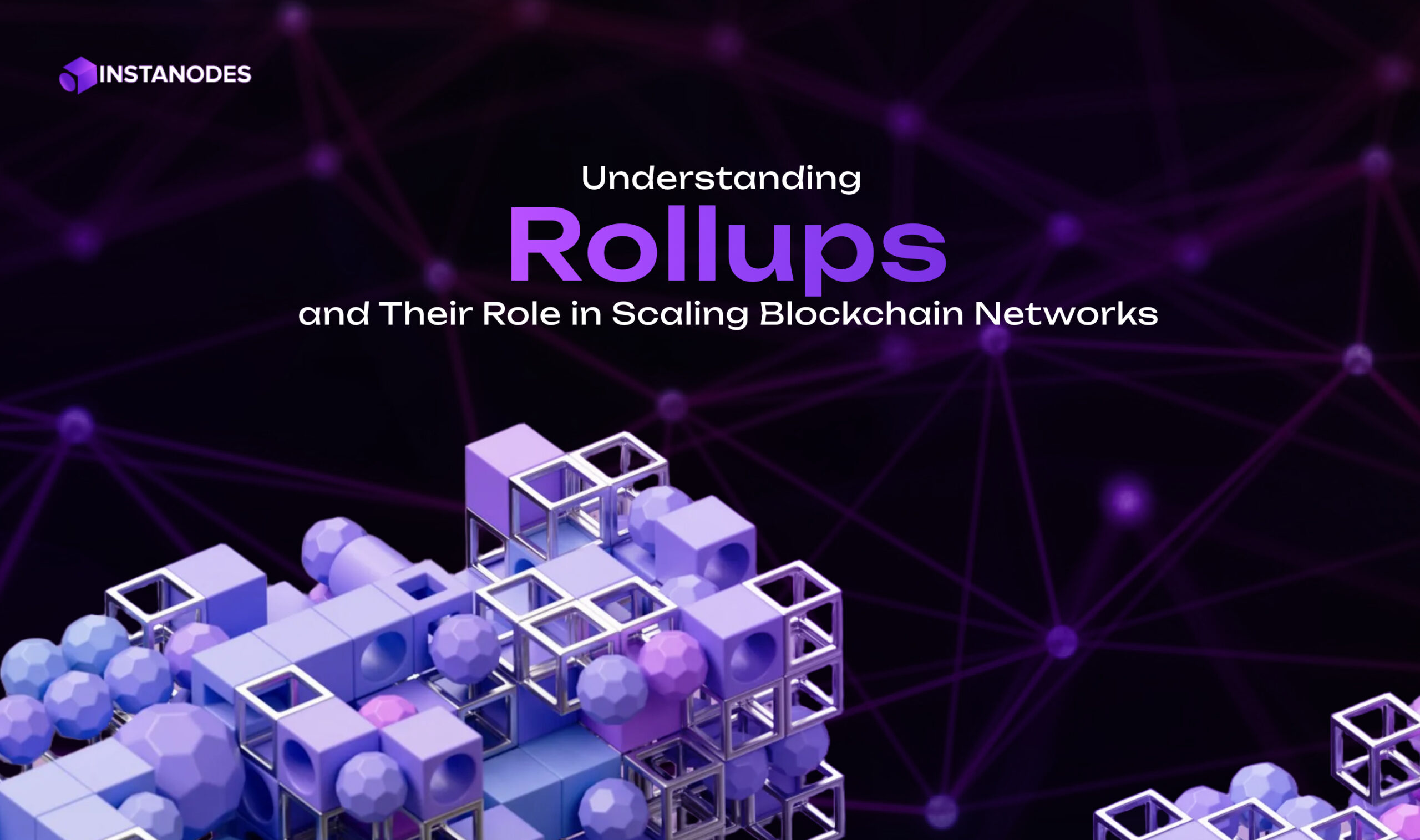Blockchain is a distributed digital ledger (also known as Distributed Ledger Technology, or DLT) that stores transactions on a network of computers. It differs from conventional databases controlled by central parties, as blockchain makes identical copies of the ledger available on its network. Every transaction is collected in a “block” and linked to earlier blocks, creating a chain of data that’s virtually impossible to hack or change.
Nodes in blockchain exist on a network of nodes spread out across a distributed system in blockchain systems. Every node keeps a replica of the entire ledger, providing decentralization and security. The nodes verify and save transactions, so the blockchain is immune to tampering. Blockchain-enabled businesses typically utilize Node as a Service offering to manage nodes effectively without having to deal with complicated infrastructure.
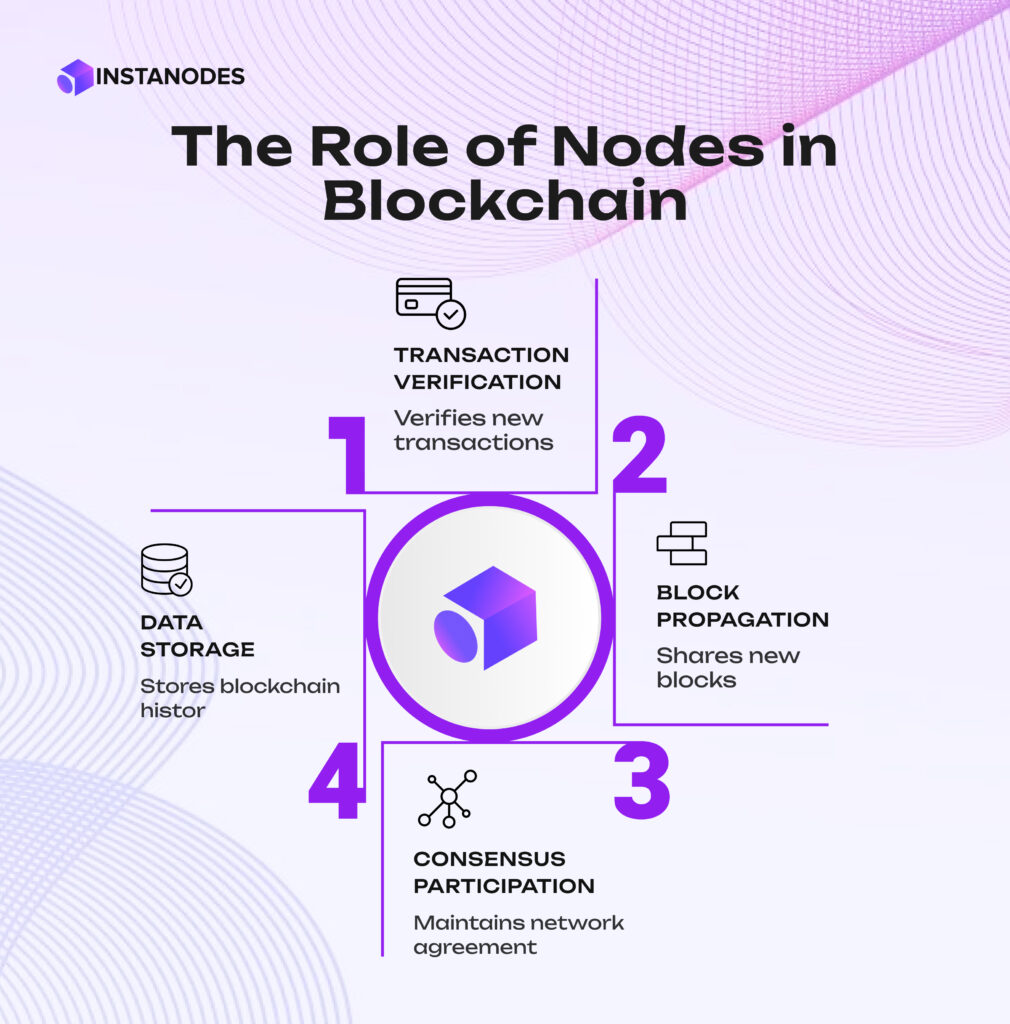
Nodes in blockchain act like a strong foundation, on which the entire architecture of DLT is constructed. These crypto nodes serve as validators as well as record-keepers of all transactions. Each blockchain node is responsible for maintaining a copy of the ledger, keeping the records transparent, and ensuring data integrity across the network.
The role of blockchain nodes has become highly significant for several reasons. They first check new transactions to ensure they adhere to the rules and protocols of the network. When anyone makes a transaction through the blockchain network, nodes in blockchain validate it and only then the record of the transaction is added to the distributed ledger. This consensus process guarantees that only valid transactions are entered.
The second most important role node services play is to help maintain the network’s security. By holding and sharing copies of the ledger, nodes establish an enduring system such that data can’t be altered or tampered with. In case, a few nodes break down or become compromised, the network still remains safe because other nodes have correct copies of the information.
Third, crypto nodes enable communication among the network. They pass on information regarding new blocks and transactions to other nodes, keeping the entire network synchronized. This ongoing communication and verification process makes blockchain networks self-regulating and reliable.
As blockchain technology continues to flourish, enterprises are tending towards Node as a Service solution that assists them to participate in blockchain networks without facing the hassle of managing their own infrastructure. Node as service providers deal with the technical aspects of node operation which allows businesses to harness the benefits of blockchain technology without being bothered.
The function of nodes continues to be crucial to blockchain’s promise of decentralization, security, and transparency, making them a critical part of this revolutionary technology.
Power Your Blockchain Applications with NaaS
Access high-performance, fully managed blockchain nodes and eliminate the hassle of maintenance and downtime.
Common Challenges in Blockchain Node Management
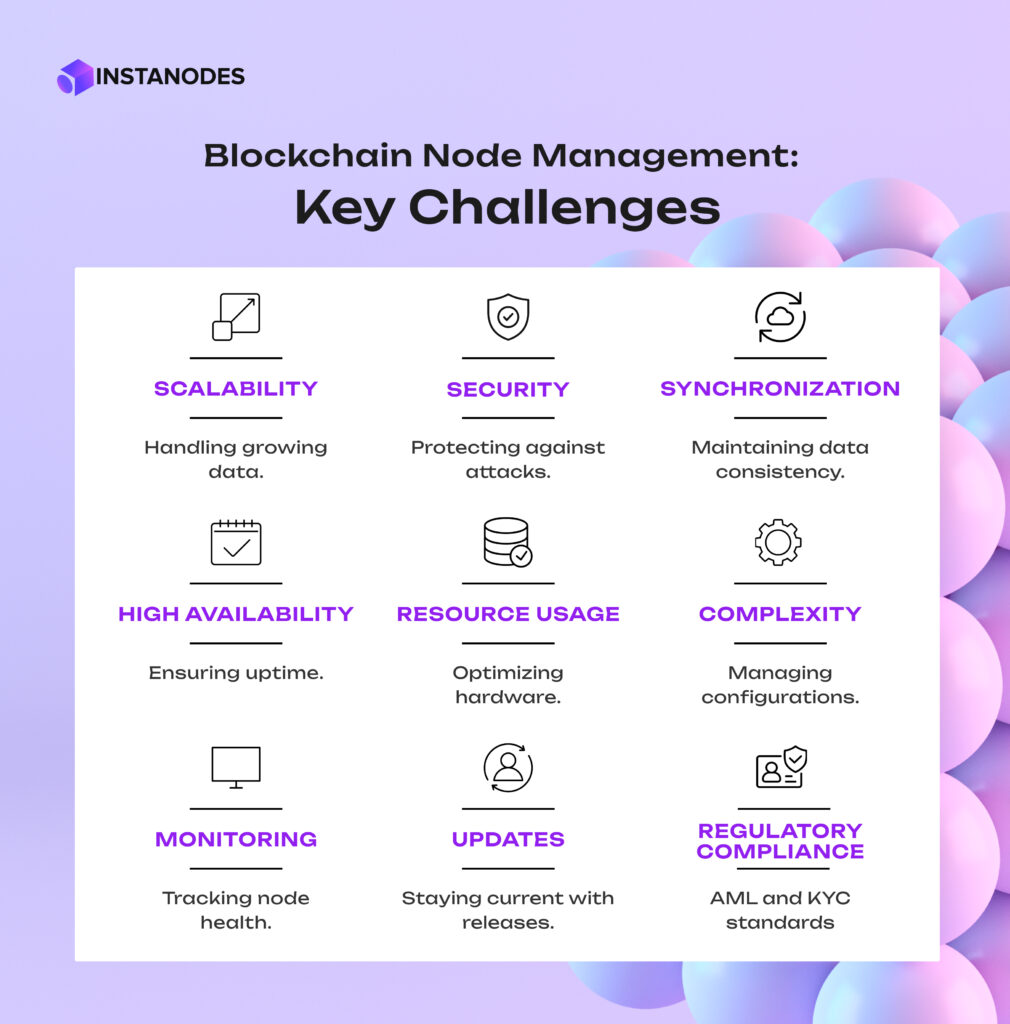
Management of blockchain nodes poses a number of important issues to developers and organizations deploying decentralized solutions. Familiarity with these issues is important in order to ensure dependable blockchain infrastructure, especially when handling nodes supporting dApps and crypto APIs.
- Complexity of Node Synchronization
Node synchronization and maintenance require substantial computational resources. Blockchain nodes have to download and validate the whole chain of transactions constantly, which can take up a lot of storage space and processing power. For instance, a full ethereum node may take several hundred gigabytes of storage and a lot of RAM to run optimally. This resource requirement usually makes organizations look for node as a service solution instead of having their own infrastructure.
- Network Connectivity
Network connectivity and stability pose ongoing challenges for blockchain node operators. Nodes must maintain consistent connections with peer nodes to participate effectively in the network. Inadequate connectivity can lead to lost blocks, delayed processing of transactions, and possible fork complications. This is especially important in dApps dependent on real-time blockchain information through crypto APIs.
- Security and Risk Management
Security management demands constant attention. Blockchain network nodes are vulnerable points for several kinds of attacks such as DDoS attempts and malicious peer connections. Properly implementing firewall regulations, access restrictions, and scheduled security updates is vital but sophisticated, particularly balancing security with requirements for network access.
- Regular Updates
Fourth, version management and protocol updates create significant operational overhead. Blockchain protocols are constantly updated and undergo hard forks, so the node operators must navigate them carefully. Inadequate or stalled updates can lead to nodes going out of sync with the network or running incompatible protocol versions, which can have an impact on downstream dApps and services.
- Network Congestion and Scalability
Fifth, scalability becomes a major concern as network activity increases. Blockchain nodes must handle growing transaction volumes and smart contract interactions while maintaining performance. This challenge manifests most obviously at times of network congestion, when node responsiveness will affect the end-user experience of dependent applications and services.
- Monitoring and Troubleshooting
Troubleshooting and monitoring demand high-level tooling and skill. Organizations need to deploy end-to-end monitoring solutions to monitor node health, performance metrics, and network status. When issues arise, debugging blockchain nodes can be complex due to the distributed nature of the network and the interaction between various protocol layers.
- Complexity in Multi-Chain Support
Most projects need support for several blockchain networks, which further complicates blockchain node management. Every blockchain has various protocols, consensus algorithms, and update cycles. Businesses must either maintain separate infrastructure for each network or use Node as a Service providers that offer multi-chain support to simplify integration.
- Compliance Issues
Compliance with regulations such as Anti-Money Laundering (AML) and Know Your Customer (KYC) adds immense complexity, particularly to businesses that deal in crypto API services. Identity verification processes have to be tightly implemented, and transaction monitoring coupled with reporting functions must be accomplished to comply with the law. Non-compliance can lead to fines, operational limitations, or harm to their reputation, so compliance becomes an important consideration when dealing with blockchain node management.
Why Do Businesses Need Nodes as a Service?
Blockchain applications including dApps, smart contracts, and financial transactions call for persistent interactions with blockchain networks. They accomplish this using crypto nodes, which also serve as storage and validating agents for transactions. It is, however, challenging to create and maintain nodes in blockchain due to issues such as infrastructure expenses, security, and technical expertise costs.
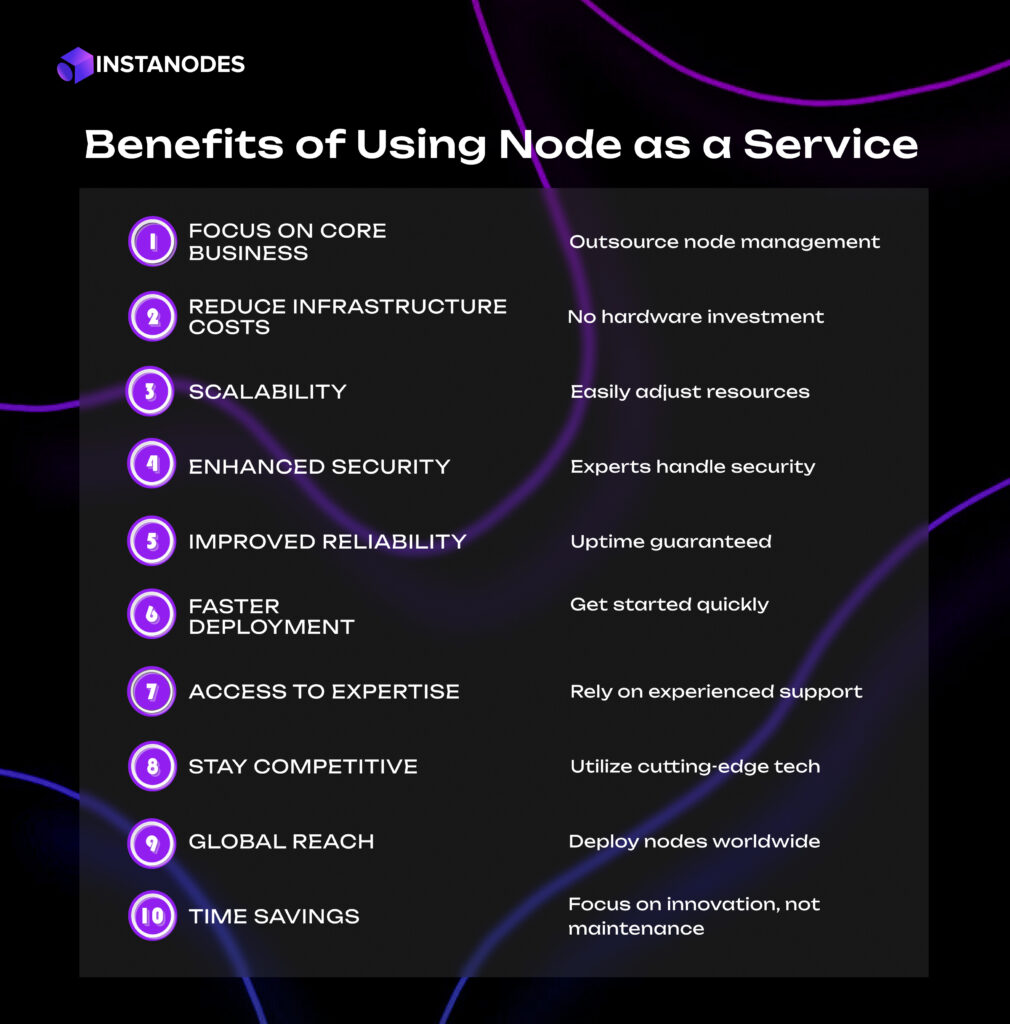
Businesses require blockchain Node as Service for several reasons:
- Seamless Blockchain Access
Developers can easily join blockchain networks, such as Ethereum nodes, without the need to deploy or manage complex infrastructure. By using node as a service solutions, they can access and interact with the blockchain seamlessly. This approach saves time, reduces operational costs, and allows faster integration with decentralized applications (dApps) and crypto APIs.
- Reliability
NaaS allow companies to leverage stable, highly available crypto API solutions that provide seamless and trouble-free interactions with blockchain networks. By taking care of blockchain node operations, these specialists prevent companies from dealing with infrastructure complexities, enhance performance, boost security, and scale easily while concentrating on their core blockchain applications and services.
- Security & Compliance
Node services with a focus on security allow companies to manage blockchain interactions effectively while protecting their infrastructure from possible threats. With the use of node as service, companies can gain trusted blockchain connectivity without laying out sensitive information or vulnerabilities, facilitating smooth transactions, increased security, and maximum performance for decentralized applications (dApps) and crypto API integrations.
- Scalability
It becomes easier for enterprises to scale their operations effortlessly without having to worry about crypto node failure, resource constraints, or maintenance issues. With node as a service solutions, they achieve high availability, minimized downtime, and maximum performance, enabling them to concentrate on innovation and expansion while the infrastructure is managed effectively in the background.
- Faster Time-to-Market
Businesses can implement blockchain applications faster and more effectively without the hassle of blockchain node setup, maintenance, or security issues. Through NaaS solutions, they avoid infrastructure complexities, minimize operational expenses, and provide seamless integration with crypto API services so that they can concentrate on innovation and scaling their decentralized applications.
- Cost Efficiency
With node services, businesses do not have to spend a lot of money to keep their own blockchain nodes running, cutting hardware and operational costs. This service provides smooth network connectivity, added security, and guaranteed performance, freeing companies from worrying about dApp development and crypto API integration while leaving the hassle of node management behind.
- Enterprise-Level Performance
High-performance dApp blockchain node services deliver end-to-end connectivity without failure or latency and enable faster transactions and increased application efficiency. Services enhance network reliability, enabling decentralized applications to perform transactions with increased speed and efficiency. Node as a Service solutions assist businesses in optimizing blockchain performance without exposing themselves to complex infrastructure, providing round-the-clock access to blockchain networks.
NaaS blockchain solutions enable businesses to build highly efficient blockchain applications without any need to spend time on infrastructure management.
How NaaS Reduces Operational Costs and Enhances Efficiency
Managing crypto nodes internally requires substantial financial and technical investments. Node as service solutions eliminate these challenges by offering scalable and cost-effective alternatives.
- Reduction in Infrastructure Costs
Running an in-house Ethereum node or a node any for any other blockchain demands high-end hardware, continuous monitoring, and network resources. NaaS providers eliminate these requirements by hosting blockchain nodes on the cloud, significantly reducing expenses.
- Lower Maintenance Effort
Traditionally, node management isn’t easy as it requires businesses to have dedicated teams for maintenance, upgrades, and troubleshooting. Node as a service blockchain solutions handle these tasks, allowing businesses to allocate resources elsewhere.
- Enhanced Efficiency
With API for blockchain, developers have access to real-time blockchain data without dealing with the complexities of nodes. This makes operations smoother and speeds up product development.
- Improved Performance & Scalability
NaaS providers achieve high availability, load balancing, and optimized performance. This enables blockchain-based companies to process high volumes of transactions effectively.
Types of Blockchain Nodes
It is essential to have a clear understanding of different types of crypto nodes before consulting a node as service provider that can handle API and blockchain infrastructure efficiently. Let’s discuss it!
- Full Nodes
Full nodes hold the complete blockchain ledger and verify transactions on their own to guarantee the validity and integrity of the network. Full nodes maintain decentralization, prevent fraud, and enhance security. Holding and authenticating all the transaction data, full nodes assist in making blockchain technology more trustless and transparent.
- Light Nodes
Light nodes keep only necessary blockchain information and depend on full nodes to verify transactions, which makes them suitable for resource-constrained devices. They do not keep the whole blockchain like full nodes but fetch required information as and when needed. They are best suited for applications that need quick access, low bandwidth, and little storage space.
- Validator Nodes
Validator nodes engage actively in consensus protocols, including Proof-of-Stake (PoS), to confirm transactions and produce new blocks. These crypto nodes guarantee network security, avoid double-spending, and maintain decentralization. Their function is vital in ensuring the integrity, reliability, and overall trustworthiness of nodes in blockchain networks.
- Archive Nodes
Archive nodes hold the complete blockchain history, making them essential for analytical purposes, historical data retrieval, and auditing. Unlike full nodes, which store only recent state changes, archive nodes retain all past transactions and smart contract states. These nodes are crucial for developers, researchers, and enterprises needing in-depth blockchain data access.
What Kind of Businesses Are Mainly Benefited with NaaS?
Several industries leverage node services to enhance blockchain adoption and optimize operations. The following businesses benefit the most from Node as a Service blockchain solutions:
- DeFi Platforms
DeFi applications need rapid and secure access to crypto nodes for hassle-free transactions. NaaS allows DeFi platforms to make smart contract executions without any delay caused by nodes, providing rapid transaction finality as well as liquidity management.
- NFT Marketplaces
NFT platforms rely on Ethereum nodes and other blockchain networks to validate ownership and transaction records. Node as service ensures these platforms run smoothly without downtime, providing high-speed data synchronization and transaction verifications.
- Crypto Exchanges
Centralized and decentralized exchanges require API and blockchain connectivity for real-time trading and transaction processing. Blockchain node as a Service offers high-speed access, low-latency transaction execution, and robust security for exchange operations, preventing downtime and failed transactions.
- dApp Development Companies
Developers creating decentralized applications (dApp blockchain node interactions) use crypto API solutions to integrate blockchain functionalities into their platforms seamlessly. NaaS helps developers focus on building intuitive user experiences without dealing with node maintenance complexities.
- Gaming & Metaverse Platforms
Blockchain-based gaming and metaverse projects need efficient node services to ensure real-time transactions, seamless in-game purchases, and digital asset ownership verification. NaaS providers enable fast data retrieval and interaction with blockchain networks, enhancing the overall gaming experience.
- Supply Chain & Logistics
Businesses in supply chain and logistics use blockchain for transparent tracking of goods, automated smart contract execution, and fraud prevention. Node as a Service blockchain solutions ensure smooth data flow across decentralized ledgers, eliminating operational inefficiencies.
- Healthcare & Identity Verification Services
Healthcare providers and identity verification platforms require blockchain technology to protect patient information, verify identities, and ensure data integrity. Node as a Service offers secure and tamper-evident access to blockchain networks, keeping sensitive information secure while remaining in compliance with regulation.
Power Your dApps Seamlessly
Connect to reliable, low-latency blockchain nodes and ensure smooth, uninterrupted operations for your decentralized applications.
What Aspects You Must Consider Before Choosing a NaaS Provider?
Choosing a suitable node as service provider is crucial for optimum performance, security, and smoother integration with blockchain networks. The below are the most critical factors to be kept in mind prior to making a conclusion:
- Network Support
Make sure that your NaaS provider is well-versed with a wide range of blockchain networks and builds the nodes for you. It may include Ethereum nodes, Binance Smart Chain (BSC), Solana, and Polkadot. Based on your project needs, multiple blockchain access ensures scalability and flexibility.
- Reliability and Uptime
A trustworthy blockchain Node as a Service provider should provide 99.9% uptime or more, avoiding interruptions that might affect transactions and dApp functionalities. Consider providers with redundant infrastructure to provide constant node availability.
- Security Features
Security is top of mind when dealing with blockchain networks. Your NaaS provider should provide features such as DDoS protection, data encryption, private key security, and role-based access control to protect sensitive information and exclude unauthorized users.
- Scalability
As your business grows, so will the demands on your blockchain interactions. A scalable node as service provider should be able to handle increased transaction loads and user activity without compromising performance.
- Integration with APIs
Choose a crypto API that integrates well with your applications. A solid blockchain API simplifies node management, enabling developers to get access to blockchain data and perform transactions with low latency.
- Node Creation for EVM and Non-EVM Blockchains
Make sure that the blockchain Node as a Service provider enables nodes for EVM-compatible blockchains (Ethereum, BSC, Avalanche) and non-EVM compatible blockchains (Solana, Algorand, Near). This will let your project support multiple different blockchain environments.
- Cost and Pricing Models
Compare pricing structures, including subscription models, pay-as-you-go options, and enterprise plans, to ensure you receive cost-effective node services tailored to your needs.
Through analyzing these factors, companies can choose a NaaS provider that promotes efficiency, lowers the complexity of operations, and aids long-term expansion.
How Instanodes Outperform Other Node Providers
InstaNodes optimizes blockchain services via streamlined infrastructure, top-notch security, and scalable solutions. We promise high availability at a 99.9% uptime to keep businesses running smoothly with uninterrupted blockchain support. Our services range from reliable node hosting to seamless rollup deployment, along with tailored AppChain integration.
What More?
- Unmatched Reliability with Node Clusters
Unlike most node as a service providers that depend on a single or few nodes, InstaNodes employs strong node clusters. This implies that your requests are spread over many crypto nodes that operate together. In case one node encounters a problem, your service continues undisturbed through another node in the cluster. This significantly reduces downtime and keeps your applications constantly connected to the blockchain.
- Beyond EVM: Broad Blockchain Support
We don’t limit you to just EVM-compatible chains. Instanodes provides access to a wide spectrum of blockchains, including both EVM and non-EVM compatible networks. This expansive support allows you to explore and innovate across a diverse range of protocols with a single, trusted provider.
- Guaranteed 99.9% Uptime
We recognize the importance of uninterrupted access to blockchain data. Thus, we provide a 99.9% uptime guarantee, which ensures that your applications and services are never interrupted. We have you covered so you can stay connected with minimal downtime and maximum productivity.
- Enhanced Performance
Our infrastructure is designed to have low latency and high throughput. With the strategic placement of servers and network setup, we reduce the latency involved in sending and receiving blockchain data to ensure quicker transaction confirmations and application responses.
- Dedicated Support
We provide proactive and informed support to help with any problems or queries you might face.
- Scalability
Our architecture is built to scale with your business. From small projects to large enterprises, we can deliver the resources necessary to fuel your growth.
Conclusion
Node as a Service blockchain solutions bring a huge change in the way businesses interact with decentralized networks. Developers no longer have to deal with the complexities of blockchain node management, enabling them to focus freely on the important business matters without worrying about blockchain infrastructure.
When choosing a node as service provider, careful consideration of network support, security, scalability, and cost is essential for long-term success. For businesses seeking a reliable and efficient NaaS solution, Instanodes emerges as a trusted industry leader, offering seamless node services and powerful crypto API integrations to support your blockchain-based applications. Whether you’re building a DeFi platform, or NFT marketplace, or require a dApp blockchain node, Our team ensures smooth, scalable, and secure access to blockchain networks.
Ready to simplify your blockchain infrastructure? Visit Instanodes today to explore our comprehensive node services and start building with confidence. Our 24/7 support team is here to assist you in selecting the appropriate solution for your requirements.
